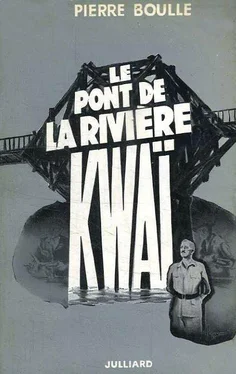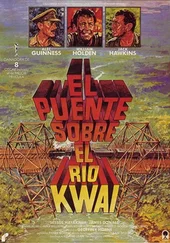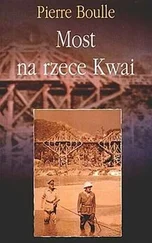Colonel Nicholson at last showed some sign of life. A strange light sparkled in his eyes. He spoke in a hollow voice: -
“Blow up the bridge?”
“Stand clear, sir. Here comes the train. They’ll think you’re in on it, too.”
The Colonel still did not move.
This was no time for argument. He would have to act. The puffing of the engine could be heard quite distinctly. Joyce realized that his legs would not carry the weight of his body. On all fours he clambered up the slope, back to his position in the undergrowth.
“Blow up the bridge!” the Colonel repeated.
He had not moved an inch. He had blankly watched Joyce’s painful progress, as though trying to grasp the meaning of the words. Suddenly he moved and followed in his footsteps. He tore through the curtain of branches which had just closed behind him and stumbled on the hide-out with the generator, on which he at once laid his hand.
“Blow up the bridge!” the Colonel once more exclaimed.
“British officer, sir!” Joyce stammered almost plaintively. “British officer from Calcutta. Orders…”
He did not finish the sentence. Colonel Nicholson had launched himself at him with a yell:
“Help!”
“Two men lost. Some damage done but bridge intact thanks to British colonel’s heroism.”
Such was the concise report which Warden, the only survivor of the trio, sent to Calcutta on his return to base.
When he read this, Colonel Green felt that there were a lot of points which needed clearing up in this strange business, and asked for an explanation. Warden replied ;that he had nothing further to say. His C.O. then decided that he had been long enough in the jungles of Siam and that a man could not be left on his own in that dangerous spot when the Japanese were probably going to search the area. At this stage of the war Force 316 was in a strong position. A second team was dropped onto a parachute ! landing some distance away to maintain contact with the Siamese, and Warden was recalled to H.Q. A submarine came to take him off from a secret beach in the Bay of ^ Bengal, which he managed to reach after an eventful two weeks’ march. Three days later he was in Calcutta and reported to Colonel Green.
He gave him a brief summary of the preparations for the attack, then came to the operation itself. From the top of the hill he had witnessed the whole scene; not a detail had escaped him. He began speaking in the cool, calculated tone which he normally used; but as he went on with his story his voice changed. During the last month that he had spent as the only white man surrounded by Siamese partisans, a flood of unexpressed sensations had been surging through him. Each episode in the drama constantly recurred, bubbling through his brain, yet with his usual love of logic he instinctively struggled to find a rational explanation and to reduce them all to a handful of universal principles.
The outcome of these conflicting mental exercises came to fight one day in the offices of Force 316. He had not been able to confine himself to a dry military report. He had felt an urgent need to unleash the storm of his fears and anxiety, his doubts and rage, and also to reveal quite candidly the reasons for the grotesque sequel in so far as he could fathom them. He was impelled by his sense of I duty to give in addition a factual account of what had happened. He tried to stick to this and occasionally succeeded, only to give way again and again to the torrent of his uncontrollable temper. The result was a strange combination of almost incoherent invective mingled with the elements of an impassioned address, sprinkled here and there with extravagant contradictions and only an occasional “fact.”
Colonel Green listened patiently and attentively to this piece of fantastic rhetoric, in which he could see no sign of the cool reasoning for which Professor Warden was famous. He was interested in facts more than anything else. But he interrupted the junior officer as little as possible. He had had some experience in dealing with men returning from similar missions, to which they had devoted themselves heart and soul only to see their efforts result in an ignominious failure for which they themselves were not responsible. In such cases he made a fairly liberal allowance for the “human element,” closing his eyes to their aberrations and pretending to overlook the occasional lack of respect in their tone of voice.
“I suppose you’d say the lad behaved like a fool, sir. Well, yes, he did; but no one in his place could have done better. I watched him. I didn’t take my eyes off him for a second. I could guess what he was saying to that colonel. He did what I should have done in his place. I watched him as he dragged himself off. The train was almost there. I didn’t know what was happening myself until the other fellow rushed at him. I only realized later, when I’d had time to think. And Shears claimed that he thought too much! My God, he didn’t think too much; he didn’t think enough! He should have been more perceptive, more discerning. Then he would have understood that in our job it’s no good cutting any old throat. You’ve got to cut the right one. Isn’t that so, sir?
“More insight, that’s what he needed; then he would have known who his enemy really was, realized it was that old blockhead who couldn’t stand the idea of his fine work being destroyed. A really perceptive mind would have deduced that from the way he strode along the platform. I had my glasses trained on him, sir; if only it had been a rifle! He had the sanctimonious smile of a conqueror on his lips, I remember. A splendid example of the man of action, sir, as we say in Force 316. He never let misfortune get him down; always made a last effort. It was he who shouted to the Japs for help!
“That old brute with his blue eyes had probably spent his whole life dreaming of constructing something which would last. In the absence of a town or a cathedral, he plumped for this bridge. You couldn’t really expect him to let it be destroyed—not a regular of the old school, sir, not likely! I’m sure he had read the whole of Kipling as a boy, and I bet he recited chunks of it as the construction gradually took shape above the water. ‘Yours is the earth and everything that’s in it, and—which is more—you’ll be a man, my son’—I can just hear him!
“He had a highly developed sense of duty and admired a job well done. He was also fond of action—just as you are, sir, just as we all are. This idiotic worship of action, to which our little typists subscribe as much as our great generals! I’m not sure where it all leads to, when I stop to think about it. I’ve been thinking about it for the last month, sir. Perhaps that silly old fool was really quite a decent fellow at heart? Perhaps he really had a genuine ideal? An ideal as sacred as our own? Perhaps the same ideal as ours? Perhaps all that hocus-pocus he believed in can be traced back to the same source that provides the impetus which lies behind our own activities? That mysterious atmosphere in which our natural impulses stir us to the point of action. Looking at it like that, perhaps the ‘result’ may have no meaning at all—it’s only the intrinsic quality of the effort that counts. Or else this dreamworld, as far as I can see, is simply a hell afflicted with devilish standards which warp our judgment, lead the way to every form of dishonesty, and culminate in a result which is bound to be deplorable. I tell you, sir, I’ve been thinking about all this for the last month. Here we are, for instance, blundering into this part of the world in order to teach Orientals how to handle plastic so as to destroy trains and blow up bridges. Well…”
“Tell me what happened in the end,” Colonel Green quietly broke in. “Nothing matters, remember, apart from action.”
Читать дальше











